update 14.
drunken officials, steamy jungles and a whole lot of rain
8 April - 16 May, 2007
Total kilometers cycled: 20,894
Equatorial Guinea and Gabon
Specific country info on routes & roads/food & accommodation/the locals available here.
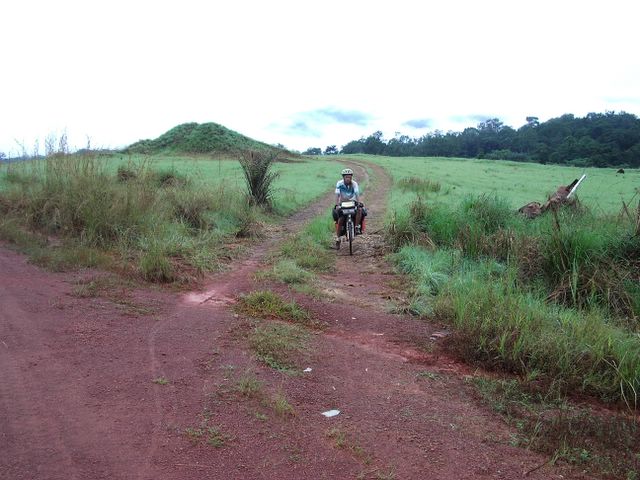 We were feeling quite smug having just made it through our 10th
police roadblock without a problem. The consensus among posters
on Lonely Planet's Thorntree travel forum was that in
postage-stamp sized Equatorial Guinea, bribes were
unavoidable: No Pay--No Pass. Obviously
these travelers didn't have our finesse with feisty border guards and
greedy bureaucrats. So we weren't expecting trouble when we rode
up to our 11th roadblock. The sound of our pedaling roused the
young soldier on duty who was dozing by the side of the road.
He was dressed in a vaguely military get-up and
quickly slipped his t-shirt on before motioning for us to approach.
Taking the passport details down proved challenging for the young
man, so Amaya dictated the required information which he painstakingly
transcribed in a large ledger. Some 20 minutes later, when he'd
checked and double checked his work, and we were preparing for a round
of cheerful goodbyes, he informed us that we would have to wait for el
Jefe to return. This sounded ominous.
We were feeling quite smug having just made it through our 10th
police roadblock without a problem. The consensus among posters
on Lonely Planet's Thorntree travel forum was that in
postage-stamp sized Equatorial Guinea, bribes were
unavoidable: No Pay--No Pass. Obviously
these travelers didn't have our finesse with feisty border guards and
greedy bureaucrats. So we weren't expecting trouble when we rode
up to our 11th roadblock. The sound of our pedaling roused the
young soldier on duty who was dozing by the side of the road.
He was dressed in a vaguely military get-up and
quickly slipped his t-shirt on before motioning for us to approach.
Taking the passport details down proved challenging for the young
man, so Amaya dictated the required information which he painstakingly
transcribed in a large ledger. Some 20 minutes later, when he'd
checked and double checked his work, and we were preparing for a round
of cheerful goodbyes, he informed us that we would have to wait for el
Jefe to return. This sounded ominous. In good time the boss stumbled in, obviously back from a drinking spree in the local bar. He was slurring his Spanish so badly we could hardly make out what he was trying to say, but it seemed to boil down to us paying 2,000 CFA each for the privilege of passing his checkpoint. We pointed out that no one else at the previous 10 roadblocks had asked for any money. Our resistance set him off on a tirade and he began ranting and raving for a good 15 minutes. When he had calmed down a bit, we restated that our visas and passports were in order and kindly asked that he allow us to continue on our way. Wrong move. He started in on another harangue and then disappeared (with our passports in hand) to return toting his Kalashnikov. We got the message and quickly dug out the 4,000 CFA to pay up. Only now it was 'too late' he said and we 'disrespectful foreigners' would have to return to Bata (100 kilometers away) to obtain a travel and photography permit. He was a 'professional' after all and couldn't allow undocumented visitors to traipse around his country without the proper authorization. We were in a bind. Being in the midst of yet another downpour we decided it was best just to sit obediently in our corner and wait to see how the situation played out. When el jefe referred to Eric as hermano and suggested he roll the bikes in out of the rain, we began to have glimmer of hope. After all, we told ourselves, there is a good side to everyone--even armed thugs in uniform. In the end, he let us go, but the passage fee had gone up to 6,000 CFA and naturally no receipt was issued. $12 was a small price to pay for our freedom we decided.
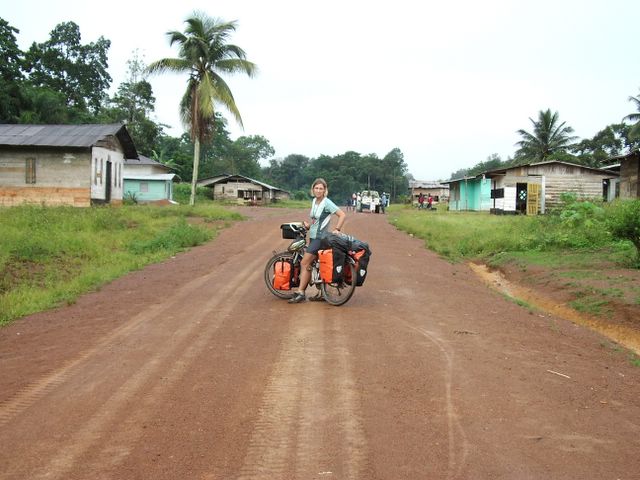 We rode off to loud snickering from the on-lookers and the humiliation
we
had endured at the hands of the corrupt official left us fuming.
It was getting dark, rain was still falling heavily, the road was
a muddy mess and we were longing for civilization. Jungle camping
held no appeal for us, so we asked around in one of the many villages
bordering the road if we might be able to pitch our tent under some
type of shelter. African hospitality being what it is, we drenched cyclists were
offered comfortable lodging at the vice-president's home. This
small settlement of perhaps fifty families had no lack of leadership--a
president, a vice-president, and two chiefs, each representing a
different clan.
We rode off to loud snickering from the on-lookers and the humiliation
we
had endured at the hands of the corrupt official left us fuming.
It was getting dark, rain was still falling heavily, the road was
a muddy mess and we were longing for civilization. Jungle camping
held no appeal for us, so we asked around in one of the many villages
bordering the road if we might be able to pitch our tent under some
type of shelter. African hospitality being what it is, we drenched cyclists were
offered comfortable lodging at the vice-president's home. This
small settlement of perhaps fifty families had no lack of leadership--a
president, a vice-president, and two chiefs, each representing a
different clan. Equatorial Guinea oil-rich and at l east some of the wealth seems to have trickled down to the lowest levels. Our hosts lived in a well-built wooden home and even had a TV and DVD player. The government had yet to provide running water or electricity, but the generator was turned on especially for our visit and we enjoyed (well not really) an evening of African pop videos with the family.
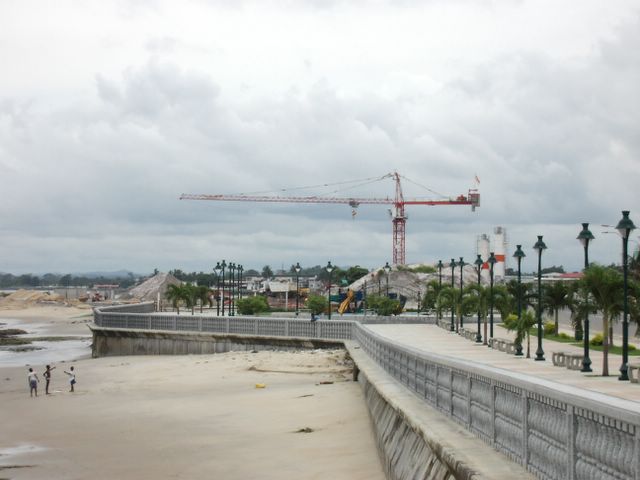 The
next day's departure from Equatorial Guinea involved an hour-long ride
in a
motorized-pirogue through an estuary to exotic-sounding Cocobeach
across the border in Gabon. The run-in at the roadblock had put a
damper on our fun and we weren't sorry to be leaving the tiny,
Spanish-speaking country.
We had been impressed by the smooth new roads being paved through
the dense forest, appalled when we found out the president is
using government money to have a flashy airport built in his home
village where giant A380 planes will be able to land and amused when
the
children called us 'Chinos'. The Chinese moved in swiftly as soon as
they realized there was money to be made in Equatorial Guinea.
They're behind most of the road building projects, they run most
of the pharmacies and small shops selling household goods and Chinese
doctors (or those claiming to be) have set up clinics all over the
country. They're everywhere. Bata, the mainland's economic
capital, boasts swanky restaurants, modern shopping complexes and a new
waterfront promenade complete with palm trees and granite benches.
Even small towns have sidewalks (unheard of in this part of the world)
and surprise, surprise there's even garbage pick-up. There's
obviously money in the country, yet the government still
struggles to provide running water in the cities and towns and since
education' isn't free, parents
still struggle to pay school fees. Not a
lot of social justice it seems.
The
next day's departure from Equatorial Guinea involved an hour-long ride
in a
motorized-pirogue through an estuary to exotic-sounding Cocobeach
across the border in Gabon. The run-in at the roadblock had put a
damper on our fun and we weren't sorry to be leaving the tiny,
Spanish-speaking country.
We had been impressed by the smooth new roads being paved through
the dense forest, appalled when we found out the president is
using government money to have a flashy airport built in his home
village where giant A380 planes will be able to land and amused when
the
children called us 'Chinos'. The Chinese moved in swiftly as soon as
they realized there was money to be made in Equatorial Guinea.
They're behind most of the road building projects, they run most
of the pharmacies and small shops selling household goods and Chinese
doctors (or those claiming to be) have set up clinics all over the
country. They're everywhere. Bata, the mainland's economic
capital, boasts swanky restaurants, modern shopping complexes and a new
waterfront promenade complete with palm trees and granite benches.
Even small towns have sidewalks (unheard of in this part of the world)
and surprise, surprise there's even garbage pick-up. There's
obviously money in the country, yet the government still
struggles to provide running water in the cities and towns and since
education' isn't free, parents
still struggle to pay school fees. Not a
lot of social justice it seems.But back to our departure. This is Africa and It goes without saying that the boat was seriously overcrowded. We were wedged in under the weight of the bicycles and on top of those were gigantic woven baskets and various sacks of goods. The man steering the boat from the back had zero visibility and relied on a boy atop our bicycles to navigate him through the waters. Apart from the numbness in the lower body things weren't going too badly until we hit some choppy waves. The canoe started taking in water, women started screaming, babies started crying, men started shouting and through all this we tried to remain calm despite being surrounded by panicking Africans. There were only six life jackets for the 40-odd passengers aboard and we were not among the lucky recipients. Well, we didn't capsize. but that little adventure sure got the adrenalin flowing.
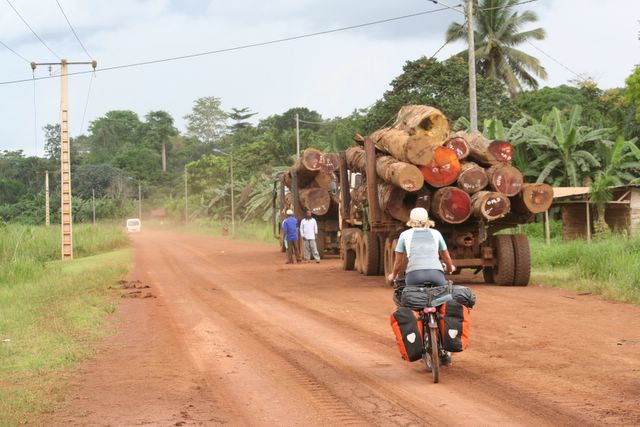 The
first thing that struck us about Gabon was the convoys
of logging
trucks carting off the nation's natural wealth. It was a sad
sight
to witness and even sadder when you know that most of the money
generated from the sale of timber is lining politician's pockets rather
than being used to pay teachers, build schools or pave roads.
What's left of Gabon's rainforest just doesn't compare with
that in Equatorial Guinea, which is so dense that when you stop
and look for a spot to take a break you realize that the
wall of massive trees and dense vegetation is
almost impenetrable. In spite of the negative effects of
poorly-regulates logging,
this region is the real heart
of tropical Africa: fast-flowing rivers spanned by rickety wooden
bridges, exotic
bird calls and monkey cries provide the background music and
insects buzz, bite and suck your blood until your limbs are just one
big red blotch.
The
first thing that struck us about Gabon was the convoys
of logging
trucks carting off the nation's natural wealth. It was a sad
sight
to witness and even sadder when you know that most of the money
generated from the sale of timber is lining politician's pockets rather
than being used to pay teachers, build schools or pave roads.
What's left of Gabon's rainforest just doesn't compare with
that in Equatorial Guinea, which is so dense that when you stop
and look for a spot to take a break you realize that the
wall of massive trees and dense vegetation is
almost impenetrable. In spite of the negative effects of
poorly-regulates logging,
this region is the real heart
of tropical Africa: fast-flowing rivers spanned by rickety wooden
bridges, exotic
bird calls and monkey cries provide the background music and
insects buzz, bite and suck your blood until your limbs are just one
big red blotch.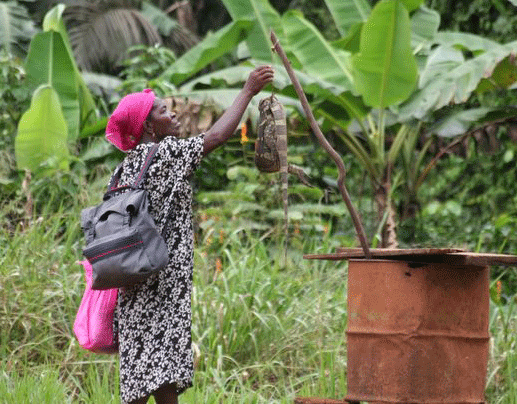 Gabon,
with a GDP of $3,780 (2002-OECD) is so much wealthier than
neighboring West African countries whose GDPs hover around $300 to
$400 that it attracts a multitude of workers from as far off as the
Sahel. Mauritanians man most of the small supermarkets,
Cameroonians have the bar and bakery businesses wrapped up, Senegalese
run the
restaurants and Malians tend the market stalls while the enterprising
Togolese have opened up small hotels. This situation
seems to have created tensions and left many Gabonese resenting their
dependence on the large foreign workforce. If you speak with the
guest workers they'll tell you that the Gabonese all aspire to cushy
office jobs where they can sit behind a desk, sign a few documents and
then head off to a nearby bar to spend the afternoon downing beer.
They're right about the beer. Even as we head to the bakery
to buy bread just after sunrise the bars start filling up
with businessmen types on the way to the office. As for us, we
always feel a certain comradeship with the other 'foreigners' and love
to sit around sharing our experiences of travel in their home countries.
Gabon,
with a GDP of $3,780 (2002-OECD) is so much wealthier than
neighboring West African countries whose GDPs hover around $300 to
$400 that it attracts a multitude of workers from as far off as the
Sahel. Mauritanians man most of the small supermarkets,
Cameroonians have the bar and bakery businesses wrapped up, Senegalese
run the
restaurants and Malians tend the market stalls while the enterprising
Togolese have opened up small hotels. This situation
seems to have created tensions and left many Gabonese resenting their
dependence on the large foreign workforce. If you speak with the
guest workers they'll tell you that the Gabonese all aspire to cushy
office jobs where they can sit behind a desk, sign a few documents and
then head off to a nearby bar to spend the afternoon downing beer.
They're right about the beer. Even as we head to the bakery
to buy bread just after sunrise the bars start filling up
with businessmen types on the way to the office. As for us, we
always feel a certain comradeship with the other 'foreigners' and love
to sit around sharing our experiences of travel in their home countries.Pythons, crocodiles, monkeys and turtles...everything is fair game for the cooking pot in Central Africa. Bush meat is a staple in this part of the world and often it's best not to peek under the lid to see what's cooking. Beans --with a generous serving of mayonnaise and Maggi-- continue to be our staple meal outside of larger towns (where we might hope for an omelette and rice), and while they used to be a meal of last resort, we now count ourselves lucky when we come across them. Nobody comes to Africa for the cuisine.
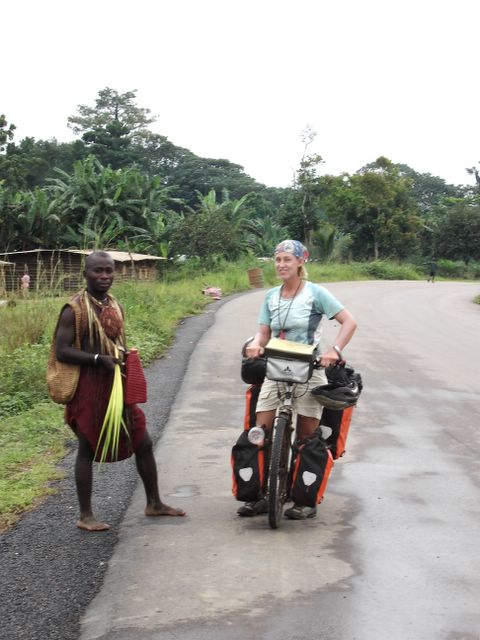 In
the big cities you can find pharmacies selling all the latest
western drugs, but villagers still like to rely on traditional methods
of healing. One Sunday morning we were greeted by a group of men
in traditional dress (much more exotic than the jeans, trainers and
t-shirts that is the usual attire) preparing for a tribal dance in
celebration of a successful healing. The patient had apparently
been a little off in the head, but was now cured thanks to a mixture of
tree bark and medicinal plants. Such remedies had even
successfully cured several cases of HIV the villagers proudly boasted.
This was a sacred affair, we were told, so we wouldn't be
allowed to stay around for the dancing and watch them apply their
make-up, unless of course we agreed to a generous contribution to
the village coffers.
In
the big cities you can find pharmacies selling all the latest
western drugs, but villagers still like to rely on traditional methods
of healing. One Sunday morning we were greeted by a group of men
in traditional dress (much more exotic than the jeans, trainers and
t-shirts that is the usual attire) preparing for a tribal dance in
celebration of a successful healing. The patient had apparently
been a little off in the head, but was now cured thanks to a mixture of
tree bark and medicinal plants. Such remedies had even
successfully cured several cases of HIV the villagers proudly boasted.
This was a sacred affair, we were told, so we wouldn't be
allowed to stay around for the dancing and watch them apply their
make-up, unless of course we agreed to a generous contribution to
the village coffers.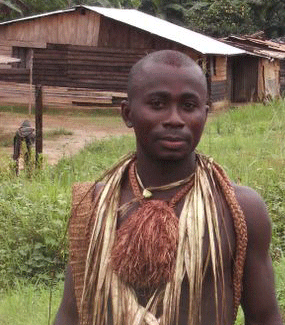
We've been reading warnings in our guidebook about impassable roads since we reached Guinea way back in October. Still we were surprised to find a veritable river flowing some 300 meters across the 'road' where we were supposed to pass on our way to the Congo border. We hopped off our bikes to do a little reconnaissance and were soon joined by a fully-loaded mini-bus and a pick-up. The men rolled up their trousers and trudged off to check out the depth of the water. It didn't appear to be deeper than mid-thigh, but the current was strong and we could see that the Africans were having trouble staying upright. Looked like a no-go for us on our heavily-loaded bikes.
As we continued to contemplate the crossing, a Land Rover arrived from the other direction, gathered up speed and plunged through the flooded area in quite spectacular fashion. Four more such crossings awaited us on the road to Ndendé, the driver told us. In one 500 meter inundated section, he explained, the water was waist deep. This was definitely not doable on the bikes. By this time other vehicles had pulled up, were dissuaded by the news and decided to turn back. We waited around for another hour in the hopes of hitching a ride on a passing truck, but the stream of traffic had dried up. Word about the bad road conditions had obviously gotten around.
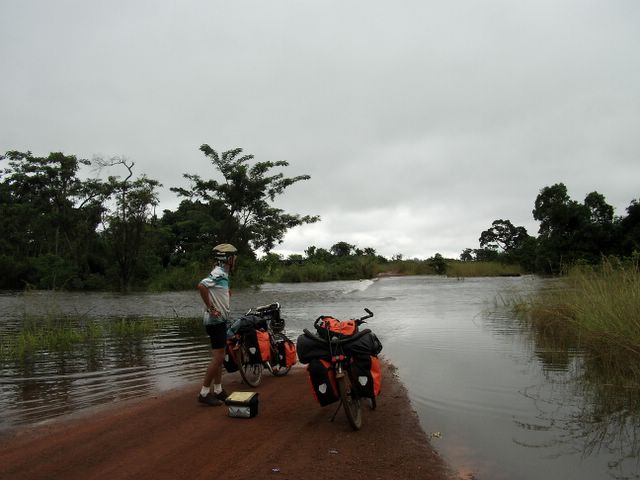
The next morning as we headed out of Mouila on our way to the border for our second attempt, we stopped to chat with some truck drivers and get an update on road conditions. It had rained during the night, so we weren't expecting good news. The flood waters had subsided, they reported, but thought passing on a bicycle would be impossible. We were in a dilemma. Should we check back into the hotel and wait another day, knowing the rains could continue and the situation might worsen? Should we ride on and risk getting stuck between two flooded areas in some godforsaken village where it would be a question of going hungry or munching monkey? Or, should we take the wimpy way out and hop on this sturdy-looking 12-wheeled truck and make it to Ndendé in a matter of hours rather than perhaps days. We opted for the truck.
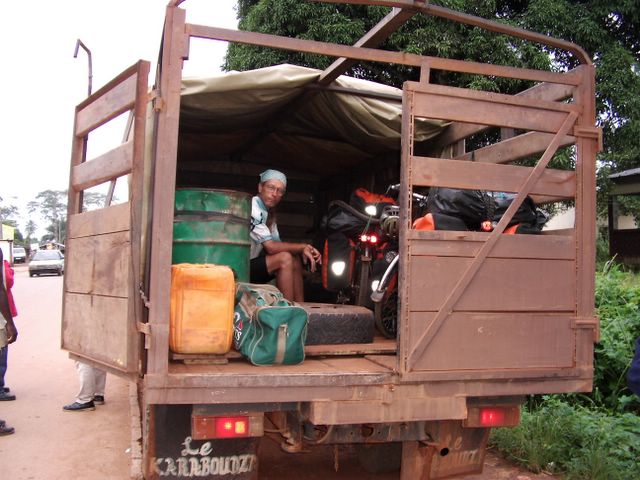 We write to you now from Ndendé and, having seen the condition
of the road, don't regret our decision. We saw pick-ups passing,
but the water was up to the bed. The only way mini-buses could
pass was to cut their engine(this prevents damage to the motor) and
have the passengers strip down and the push the vehicle through the
waist-deep water. It was awesome to see the skill of the African
drivers and a real adventure even if we had to enjoy the spectacle
being tossed around in the back of the truck rather than being bumped
around on our bikes.
We write to you now from Ndendé and, having seen the condition
of the road, don't regret our decision. We saw pick-ups passing,
but the water was up to the bed. The only way mini-buses could
pass was to cut their engine(this prevents damage to the motor) and
have the passengers strip down and the push the vehicle through the
waist-deep water. It was awesome to see the skill of the African
drivers and a real adventure even if we had to enjoy the spectacle
being tossed around in the back of the truck rather than being bumped
around on our bikes. A trip to the local hospital confirmed that Eric has come down with malaria for the 3rd time in less than a year. He's fighting a high fever and aches all over, but should be feeling better as soon as the anti-malarials kick in. We've had our share of bad luck (Eric's accident, broken low-rider, damaged camera, a bout of malaria for each of us, two chipped fingernails) over the last few months, and sometimes we're not far from throwing the towel in.
Less than 50 kilometers separate us from Congo. The locals tell us road conditions deteriorate on the other side of the border, so travel won't be easy. Another obstacle to steer clear of will be the so-called 'ninja rebels' who are running a low-level insurgency in the region near Brazzaville. Travelers before us have been strongly advised (and some forced) to take the train rather than risk a possible attack on the road. Both physically and mentally, this is a tough part of the continent to cycle through. Fortunately, the kindness of the locals and the beauty of the landscapes keep our spirits up (and of course your emails of encouragement help, too).
The coming weeks promise to be full of adventure and a few hardships as well. We'll update you soon to let you know how we fare with the rigors of the Congos.
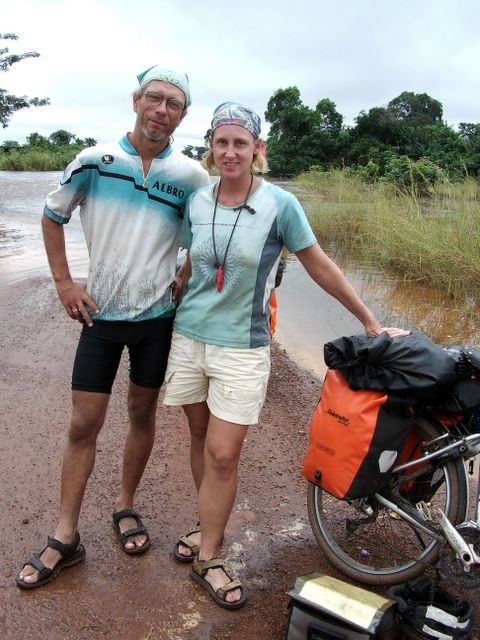
contact us at: worldbiking@gmail.com
Support our chosen charity and help educate girls in Africa-more info here
